'Round the Table' Family Catechesis
Freedom III, The Holy Mass, Part 2 (11)
SUBJECT: How has Jesus worshipped God?
AIMS:
- To understand that the way we worship God in response to his liberating and unconditional self-giving is rooted in the events that happened on the road from slavery to the Promised Land and in the way the Israelites worshiped God.
- To understand how Jesus has worshiped God and to understand that the mission and the calling of Jesus is proclamation and establishment of a new Promised Land - God’s Kingdom.
- To know the circumstances of Jesus’ death and resurrection.
- To understand, that Jesus became the Passover lamb:
• The words spoken at the Last Supper announce the sacrifice, that Jesus will make of himself for the new and everlasting covenant (communion)
• Jesus died while thousands of lambs were offerd as the Passover sacrifice. - To understand that the death and resurrection of Jesus was a sacrifice offered for communion and thanksgiving, for saving from death (receiving eternal life), for saving lives, for saving from oppression, thanksgiving for freedom.
- What happened on the way from Slavery to the Promised Land?
- Why are these events important to us? (Whatever God has done in the past, He has done for all generations, so he is doing it in our life. These events influenced the way Mary, Joseph and Jesus worshipped God, and the way we worship God.)
- Why do we worship God? (We worship God in response to his liberating, unconditional self-giving)
- How did the Israelites worshiped God? (Through prayer, learning and work, through celebration of the Passover sacrifice, trough study of the Word of God)
- Where did the Israelites worshiped God? (Places of learning and work, temple, home, synagogue)
- Why did the Israelites prayed, studied, work, offer sacrifice and listened the Word of God (To respond to God’s liberating, unconditional self-giving, to exit from slavery to the Promised Land - Freedom, to live in communion)



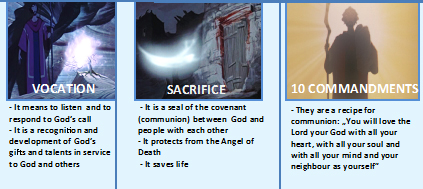

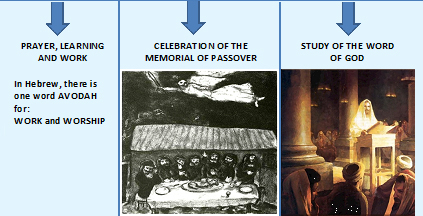



Jesus, son of God, but also son of Mary and Joseph, was born in Jewish family. He has learned from His earthly parents how to worship God, how to respond to God’s liberating and unconditional self-giving. Today we will see how Jesus worshipped God and how did that influence the way we Christians, followers of Christ worship God.


Jesus, just like Moses, answered God’s call, to lead us from slavery to freedom. Jesus listen to the voice of His Father in prayer, He worked as a carpenter, He healed sick.
Every Sabbath Jesus went to the Synagogue. He spent time talking and listening to people, He taught people individually and He a He addressed crowds that followed Him. He also taught while eating and drinking with sinners.











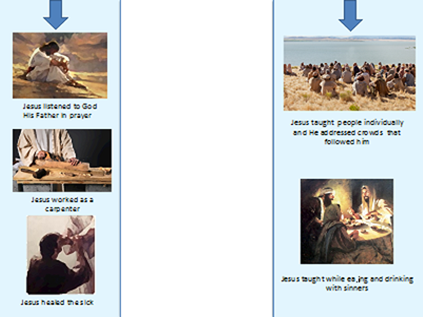
Jesus begins His mission from the Baptism in Jordan near Jericho, where Israel entered the Promised Land. After receiving the Holy Spirit at his Baptism, He reveals the purpose of His mission.
- What is the mission and the calling of Jesus?
The mission and the calling of Jesus is proclamation and establishment of a new Promised Land - God’s Kingdom. He goes about Galilee "preaching the Gospel of God and saying: 'The time is fulfilled, and the kingdom of God is at hand; repent and believe in the Gospel'.
- When did you learn or hear about God’s Kingdom?
We had a session about the History of God’s Kingdom.
We also pray for God’s Kingdom in the “Our Father”.
- What is being said about God’s Kingdom in that prayer?
“Thy Kingdom come, Thy will be done, on earth as it is in heaven.”
- What this prayer tells us about God’s Kingdom?
- Where does it exist?
The Kingdom of God is in heaven.
- Can it exist on earth?
Yes, if we do God’s will; if we follow Good Shepherd’s voice and live in communion with God and with each other.
FOR PARENTS:
- What does Jesus reveal about God?
Jesus revealed above all in parables, that God, whom he addresses by the intimate term Abba, Father, is sensitive to the needs and sufferings of every human being, he is the Father filled with love and compassion, who grants forgiveness and freely bestows the favors asked of him.
- How will the Kingdom grow?
Every person therefore is invited to "repent" and to "believe" in God's merciful love. The kingdom will grow insofar as every person learns to turn to God in the intimacy of prayer as to a Father (cf. Lk 11:2; Mt 23:9) and strives to do his will (Mt 7:21)
- What is the aim of the Kingdom of God?
The liberation and salvation brought by the kingdom of God come to the human person both in his physical and spiritual dimensions. Two gestures are characteristic of Jesus' mission: healing and forgiving.
The kingdom aims at transforming human relationships; it grows gradually as people slowly learn to love, forgive and serve one another. Jesus sums up the whole Law, focusing it on the commandment of love (cf. Mt 22:34-40; Lk 10:25-28). “Love one another; even as I have loved you" (Jn 13:34; cf.15:12). Jesus' love for the world finds its highest expression in the gift of his life for mankind (cf. Jn 15:13), which manifests the love, which the Father has for the world (cf. Jn 3:16).
The kingdom's nature, therefore, is one of communion among all human beings-with one another and with God.
How can we become an unconditional gift to another person?
As you have learned at home after the previous session, Jesus celebrated Passover Memorial with His parents travelling to Jerusalem to offer the sacrifice of the lamb in the temple and to express communion with God and with each other.
- How did Israel celebrate the Passover?
- What did each family had to do upon their arrival in Jerusalem to celebrate Passover?
- What was made present during the Passover ritual?
- What custom related to bread and wine was included in the Passover celebration?
The families, that arrived in Jerusalem for Passover, went to the temple; they had to first exchange their currency for the temple coins, and then buy “unblemished”* lamb for sacrifice. They would give the lamb to the priest for sacrifice. Then they would take the lamb home, cook it and they celebrated the day of remembrance by making present all the events of the Exodus and by eating lamb in the company of loved ones.
*During the times of Jesus, the priests in the temple were corrupted. In order to make money, they did not except sacrificial animals brought from the outside as being "unclean". They required people to buy the sacrificial animal in the temple, using the “temple” money. Therefore people had to first exchange their currency for the temple coins, and then buy “unblemished” lamb for sacrifice paying relatively high price. This was among other things a reason that Jesus turned over the tables in the temple.
Offering the Passover sacrifice included the custom of blessing God for life and especially the sources of life.
Before the meal God was blessed for bread:
“BLESSED ARE YOU LORD, GOD OF ALL CREATION, FOR THROUGH YOUR GOODNESS WE HAVE RECEIVED THIS BREAD WE OFFER YOU, FRUIT OF THE EARTH AND WORK OF HUMAN HANDS. BLESSED BE GOD FOREVER”.
After the meal God was blessed for wine:
“BLESSED ARE YOU LORD OF ALL CREATION FOR THROUGH YOUR GOODNESS WE HAVE RECEIVED THIS WINE WE OFFER YOU, FRUIT OF THE VINE AND WORK OF HUMAN HANDS. BLESSED BE GOD FOREVER”.
- What were the circumstances of Jesus’ death and resurrection?
- How did crowds greet Jesus when he arrived in Jerusalem?
- What did Jesus say during the Last Supper that probably had shocked his disciples?
One year, when Jesus was about 32 years old, He came to Jerusalem to celebrate Passover with His disciples. He was greeted by crowds that shouted: Hosanna! Save us! Liberate us!
During the Passover meal with His disciples He said something that probably shocked his disciples: “TAKE IT ALL OF YOU AND EAT OF IT, FOR THIS IS MY BODY WHICH WILL BE GIVEN UP FOR YOU.
TAKE THIS ALL OF YOU AND DRINK FROM IT, IS THIS IS THE CHALICE OF MY BLOOD OF THE NEW AND ETERNAL COVENANT, WHICH WILL BE POURED FOR YOU AND FOR MANY FOR THE FORGIVENESS OF SINS. DO THIS IN MEMORY OF ME“.
Jesus was crucified while hundreds of lambs were sacrificed in the temple, He become the sacrificial Lamb of God. But He was risen after three days.











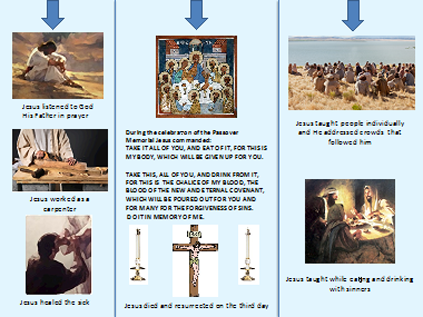
CATECHESIS 8b
SUBJECT: How do we worship God? The Holy Mass Part 2
AIMS:
1. To understand that to fulfill Jesus’ commandment "Do this in memory of me" we celebrate the memorial of His death and resurrection by making it present during the Eucharist and participating in the original event that took place 2000 years ago. During Eucharist all that God has done, is doing and will do for humanity is made present.
2. To understand, that we worship God through prayer, learning and work, and during the Mass in the Liturgy of the Word and in the Liturgy of the Eucharist
3. To understand and memorize the order of rites during the Mass
4. To recognise that God equips us in many gifts.
5. To understand, through analysis of the image of the relationship of the grain of wheat with the light and water, that we live the Eucharist in everyday life through unconditional self-giving relationship with God and with each other - communion.
6. To understand that our sacrifice is our suffering related to “dying” to our selfishness, addictions, self-doubt, fear, laziness, etc.
7. To understand that development of our talents and using them in service to others bring fulfilment in our life.
We also worship God as Jesus and Israelites did.
- How do we worship God? (Through listening to God’s call, through learning and work)
- Do we also go to the synagogue to study the Word of God and to the Temple to offer sacrifice and celebrate the Passover?
We go to the Church and participate in the Holy Mass, which has two parts; during the first part LITURGY OF THE WORD we listen to and reflect on the Word of God; during the second part LITURGY OF THE EUCHARIST Jesus’ sacrifice is made present.
(To the Freedom puzzle we add three cards under the title “How do we worship God?”)













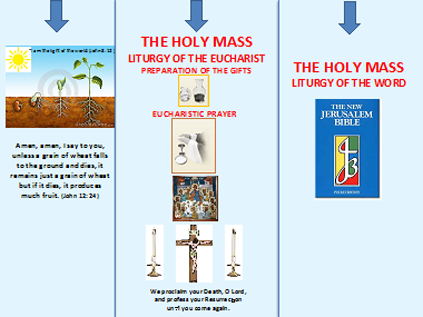
We take puzzle with the Holy Mass:
Children place the title “THE HOLY MASS”, “LITURGY OF THE WORD” and “LITURGY OF THE EUCHARIST”.
- What does the word “liturgy” mean? (Work)
- Who is working? (God and we respond by preparing, listening, following his voice, worshipping him)
- What does God do in the Liturgy of the Word? Remind yourself what does the Good Shepherd do? (Calls each sheep by name, leads them, cares for them....)
Remember, the sheep were always together (in communion) when they followed Good Shepherds voice.
- What does this mean for us?
If we want to live in communion we need to listen to and reflect on the Word of God, and fulfil the 10 Commandments. We listen to the readings from the Bible.
Place the picture of the Bible under the LITURGY OF THE WORD.
LITURGY OF THE WORD

- What happens during the Liturgy of the Eucharist?
Take the PREPARATION OF THE GIFTS
Just like Israel before and after the sacrificial meal, we too, during the Mass, bless God for life and the source of life: bread and wine. Remember? We prepare bread and wine with a drop of water. Place the card with the prayer of mixing water and wine.
PREPARATION OF THE GIFTS

During the Eucharistic prayer, through the power of the Holy Spirit, wine, bread and the drop of water turn into the Body of Jesus.
Put card with Epiclesis.

- What happens next during the Mass?
We offer sacrifice.
- Who is the sacrificial lamb?
- Do you remember what happened when the wolf scattered sheep?
(Good Shepherd gave his life for sheep, and he was risen in three days so that the sheep were together again; safe, in COMMUNION)
During the Holy Mass the Passover meal and Jesus’ death and resurrection are made present:
We add picture of the Last Supper, cross that symbolize Jesus’ death and candles that symbolize His resurrection.
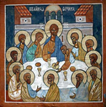
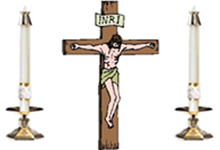
THE PARABLE OF THE GRAIN OF WHEAT
Jesus, like Moses, answered His vocation. He worked as a carpenter; He was healing many people and taught in the synagogues. Above all, by His death and resurrection He frees humanity from the slavery of sin and leads us to the new Promised Land - the Kingdom of God.
In communion with Him, in Him and through Him we must respond to our vocation: listen to God’s call, recognize and develop talents and gifts received from God and use them in service to God and others.
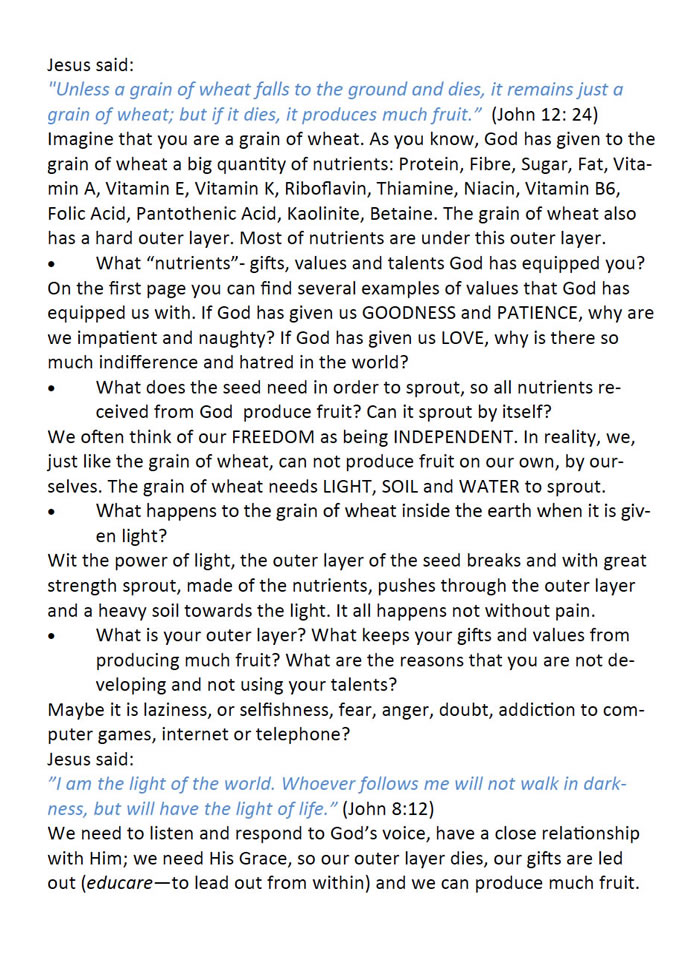
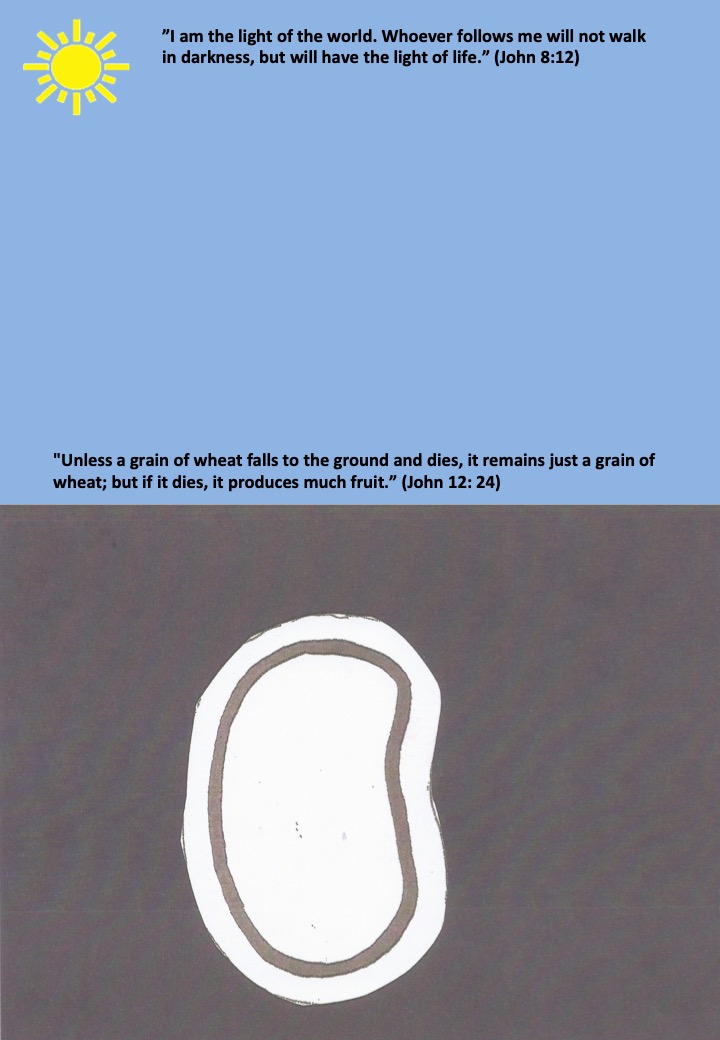
THE PARABLE OF THE TALENTS
Please, read with children this parable. There is a children version below, that you can read first, but then please read the full Bible version from the Gospel of Matthew and discuss with children questions that follow.
14 It will be as when a man who was going on a journey called in his servants and entrusted his possessions to them. 15 To one he gave five talents; to another, two; to a third, one—to each according to his ability. Then he went away. Immediately 16 the one who received five talents went and traded with them, and made another five. 17 Likewise, the one who received two made another two. 18 But the man who received one went off and dug a hole in the ground and buried his master’s money. 19 After a long time the master of those servants came back and settled accounts with them. 20 The one who had received five talents came forward bringing the additional five. He said, ‘Master, you gave me five talents. See, I have made five more.’ 21 His master said to him, ‘Well done, my good and faithful servant. Since you were faithful in small matters, I will give you great responsibilities. Come, share your master’s joy.’ 22[Then] the one who had received two talents also came forward and said, ‘Master, you gave me two talents. See, I have made two more.’ 23 His master said to him, ‘Well done, my good and faithful servant. Since you were faithful in small matters, I will give you great responsibilities. Come, share your master’s joy.’ 24Then the one who had received the one talent came forward and said, ‘Master, I knew you were a demanding person, harvesting where you did not plant and gathering where you did not scatter; 25 so out of fear I went off and buried your talent in the ground. Here it is back.’ 26 His master said to him in reply, ‘You wicked, lazy servant! So you knew that I harvest where I did not plant and gather where I did not scatter? 27 Should you not then have put my money in the bank so that I could have got it back with interest on my return? 28 Now then! Take the talent from him and give it to the one with ten. 29 For to everyone who has, more will be given, and he will grow rich; but from the one who has not, even what he has will be taken away. 30 And throw this useless servant into the darkness outside, where there will be wailing and grinding of teeth.’ (Matthew 25:14-30)
The parable concludes with one of the unavoidable laws of life.
- What does it mean: “For to everyone who has, more will be given, and he will grow rich; but from the one who has not, even what he has will be taken away.”
The following example will help you to understand this law of life: If we discipline and training our bodies, they will grow ever fitter and stronger; if we do not, they will grow flabby and lose much of the strength we have.
Can you find more examples for this law of life?
There is no such thing as standing still in the Christian life. We either get more or lose what we have. We either advance to greater heights or slip back.
- Which servants perform better?
Please notice that servants with faith - the faithful servants - multiplied their talents.
Remember the Parable of the Grain of Wheat? Can a seed germinate without light?
So, we too, cannot achieve better results without faith and a close relationship with the Lord Jesus, our Light of Life.
- What can you say about the trust of the King (God)?
He gave his servants the money and then went away and left them to use it as they could, and they thought the best. He did not in any way interfere with them. He left them to their own devices. That is the way in which God trusts us. He trusts us to do so much by ourselves.
- What is the reward for the work well done?
The reward that the faithful servants received was not one, which they could enjoy by sitting down and folding their hands and doing nothing. The reward of work well done was more work to do. The great reward of God to the man who multiplied his talents is more trust and responsibilities and therefore, SHARING IN MASTER’S JOY.
The greatest REWARD for a man is giving him bigger and more difficult tasks to perform.
- What do you think the following words might mean?
“And throw this useless servant into the darkness outside, where there will be wailing and grinding of teeth.”
What awaits a person who DOES NOT NAME, DEVELOP AND SHARE his talents?

















 English
English  Polski
Polski